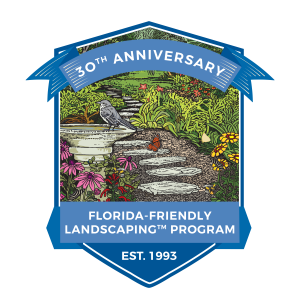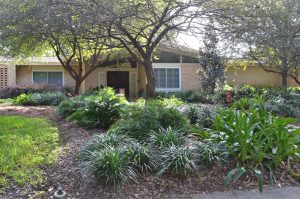 Join us in celebrating 30 years of Florida-Florida Friendly Landscaping™ with this blog series. Since 1993, Florida-Friendly Landscaping™ has served as the state of Florida’s premier Extension program that promotes sustainable alternatives to “conventional” landscaping, providing guidance on low impact, environmentally friendly, science-based landscape practices that use less water and reduce pollutant loading to Florida waters. In this series, you will learn:
Join us in celebrating 30 years of Florida-Florida Friendly Landscaping™ with this blog series. Since 1993, Florida-Friendly Landscaping™ has served as the state of Florida’s premier Extension program that promotes sustainable alternatives to “conventional” landscaping, providing guidance on low impact, environmentally friendly, science-based landscape practices that use less water and reduce pollutant loading to Florida waters. In this series, you will learn:
1. Five FFL Facts to Know to Help you Grow
2. What’s the Word? Five FFL Terms to Know
3. Take Some Action in Five Simple Steps!
4. Five Steps to Become a Florida Friendly Landscaper
5. Five Ways to Know You are a Florida-Friendly Follower
Florida-Friendly Landscaping™ (FFL) is a program that teaches residents how to landscape more sustainably. Even if you don’t know one thing about FFL, here are five actions you can take today that are Florida-Friendly and will help our environment:
- Avoid applying routine seasonal fertilizing of plants in your landscape. All plants need nutrients to grow, usually getting nutrients from the soil. During each season, observe your trees, shrubs and other plants. If your plant is thriving, putting out new growth and/or blooming as expected, consider skipping the fertilizer. When fertilizing for a specific need, use slow-release type. Overfertilizing your plants can lead to increased pests and increased pollution.
- Never blow grass clippings, leaves, or other debris into streets, sidewalks or roadways. Doing so causes excess nutrients and other chemicals to be swept into our stormwater systems, ending up in our lakes, rivers, bays and other natural water resources. These nutrients and chemicals are major causes of water pollution in Florida. Section 3-5 of the Polk County Fertilizer Ordinance specifically forbids this practice.
- Be aware of your irrigation habits. Many landscaping water problems are caused by overwatering as opposed to under watering our plants. Too much or too frequent supplemental irrigation encourages diseases, excess pests, and excess water runoff. Did you know that your local water ordinance governs the number of days per week that landscape irrigation may be applied? Currently in Polk County, depending on your location, it is one or two days per week, and is subject to change, depending on current conditions. (Always check with your local water provider.) This means a MAXIMUM number of days irrigation can be applied. It is NOT a recommendation to routinely apply irrigation with no regard to the amount of rainfall that occurs. Learn how to appropriately apply supplemental irrigation to achieve healthy landscape plants!

- If your landscape is mainly lawn, consider carving out a space for a new plant bed. The plant bed can be as simple as 1-3 small trees or a mixture of trees and shrubs, even beautiful flowers! Plant-beds are not only attractive, they absorb and filter rainfall, increasing water retention on your property and decreasing stormwater runoff. Your Polk County Master Gardener Volunteers can advise on plant selection and design ideas for your Florida-Friendly Landscape. See below for contact information.
- Don’t be too quick to reach for pesticides! If you are able to reduce the amount of pesticides used in your landscape, you are well on your way to helping your environment. If you see evidence of plant distress, it could be from insects, disease, or a variety of other causes. If you have questions regarding the health of your plant, call your UF/IFAS Extension Plant Clinic to help you identify your problem and the least toxic approach to address it.
Resources:
Here is the website for FFL in Polk
Florida-Friendly Landscaping(tm) Guide to Plant Selection & Landscape Design
For more information, contact UF/IFAS Extension Polk County at (863) 519-1041 or visit us online at http://sfyl.ifas.ufl.edu/polk. The Plant Clinic is open Monday-Friday, 9:00 am-4:00 pm to answer your gardening and landscaping questions. Give us a call or email us at polkmg@ifas.ufl.edu.
If you are not in Polk County, Contact your local UF/IFAS Extension Master Gardener Volunteer Plant Clinic.
The Florida Master Gardener Volunteer Program is a volunteer-driven program that benefits UF/IFAS Extension and the citizens of Florida. The program extends the vision of the University of Florida/Institute of Food and Agricultural Sciences, all the while protecting and sustaining natural resources and environmental systems, enhancing the development of human resources, and improving the quality of human life through the development of knowledge in agricultural, human and natural resources and making that knowledge accessible.
This article was written by Master Gardener Volunteer Molly Griner under supervision of the Master Gardener Volunteer Coordinator and Residential Horticulture Extension Agent Anne Yasalonis.
An Equal Opportunity Institution.
 0
0

